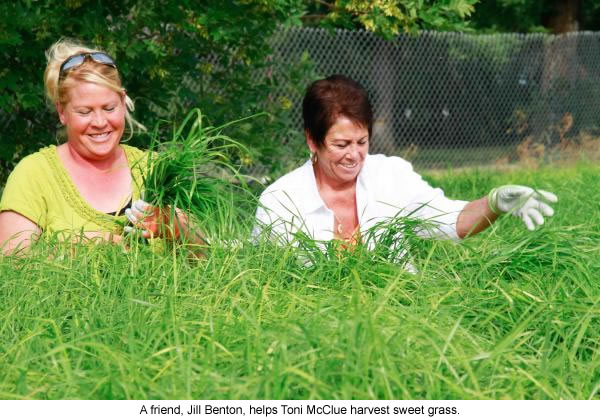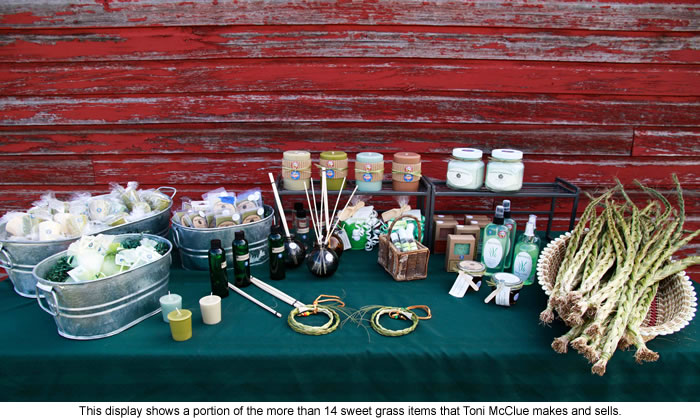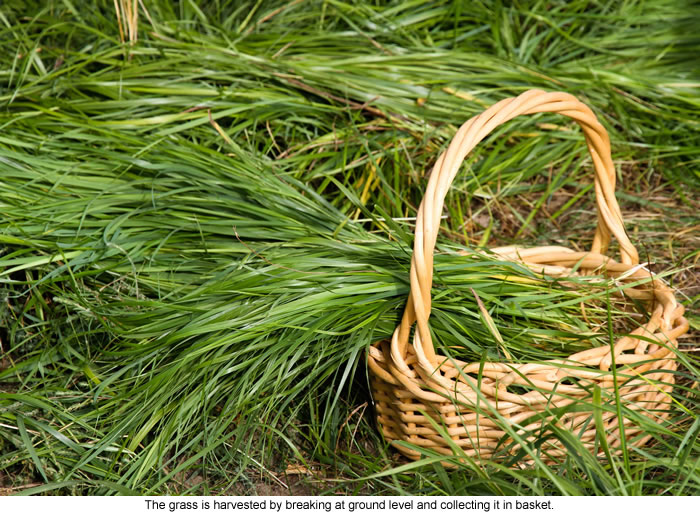 |
Canku Ota
|
 |
|
(Many Paths)
|
||
|
An Online Newsletter
Celebrating Native America
|
||
|
NOVEMber
2013 - Volume 11 Number 11
|
||
|
|
||
|
It Smells Like Success:
How One Sweetgrass Business Grows
|
||
|
by Jack McNeel - Indian
Country Today Media Network
|
||
|
credits: photos by Jackie
McNell
|
|
There are perfumes, body sprays, soaps, sachets, candles, air fresheners and more—all carrying the wonderful fragrance of sweetgrass.
Since Toni McClue, a Chippewa-Cree from Turtle Mountain, put her sweetgrass products on the market three years ago, she has garnered a dedicated following. One Native man recently purchased 90 sweetgrass braids—her biggest seller, she told Indian Country Today Media Network. McClue owns a small plot of land, roughly 60 by 100 feet, where she planted sweetgrass—enough for two harvests each year. Her first cut of grass generally reaches 50 inches tall, and the second harvest generally measures about 27 to 28 inches, she says. McClue's dream is to purchase a five-acre irrigated plot and start out planting an acre of sweetgrass.
Her business began by taking her products to the farmer's market in Great Falls. Sales were strong from the first week, and she continues to sell at the market in addition to selling wholesale to many local Montana businesses. "That first year I got about 35 stores, and from then on it's been more and more. Last month I picked up three new stores, and this month I picked up two more. I'm busy!" she exclaims, adding that she also ships her products to buyers around the country. And perhaps international sales are on the horizon; recently she received a phone call from a buyer in France. McClue loves the grass, loves the smell and texture, and can
produce beautiful braids in rapid time. She hates to waste any of
it and uses the shorter strands for small items to take to market,
such as air fresheners she creates with a little beadwork for customers
to hang in their cars. She also makes little bundles of grass, which
make good fire starters. "It not only smells great but also starts fires easily as it smolders slowly," she says. Sweetgrass is considered a sacred plant throughout much of Indian country and used in prayers and smudging ceremonies. Unfortunately sweetgrass is no longer as plentiful as it once was due to changes in farming practices, increases in construction, and various other activities. But for those who do grow sweetgrass, the market is larger. Demand hasn't died down with production, McClue says. Among her buyers are hospitals, the Department of Agriculture in Montana, and the Montana state prison, where Natives use for religious and healing purposes. Buyers are both Indian and non-Indian alike. "I think Natives are particular about who they buy from because it's a sacred grass," McClue said. "Now that they're finding out I'm Native, that kind of makes a difference. I have a lot of Native customers but not as many as I'd like." The winter months, when grass is dormant, offer the opportunity to catch up on some of the other products. Candles are a big seller and time-consuming to produce. McClue makes all the candles personally by hand. "I have a big kitchen and have two cupboards for my dishes and my food. The rest are for [candle] supplies," she laughs. "These are triple poured candles and will burn about 60 hours." The wax is poured at three different temperatures, making them solid and removing any air. She also produces some that have a 90-hour burning period, plus little ones that burn about 15 hours.
She makes hundreds of candles and starts the spring with about 800 on hand, then has to restock within a couple of months. McClue only works with sweetgrass, so everything is the same scent. "The only variation would be in colors," she says. Toni McClue can be contacted at (406) 899-3433, www.facebook.com/MTSweetgrassEtc, or email at montanasweetgrassetc@mcclue.ws. |
|
|
||
|
|
||
| Canku Ota is a free Newsletter celebrating Native America, its traditions and accomplishments . We do not provide subscriber or visitor names to anyone. Some articles presented in Canku Ota may contain copyright material. We have received appropriate permissions for republishing any articles. Material appearing here is distributed without profit or monetary gain to those who have expressed an interest. This is in accordance with Title 17 U.S.C. Section 107. | ||
|
Canku Ota is a copyright ©
2000 - 2013 of Vicki Williams Barry and Paul Barry.
|
||
 |
 |
|
|
The "Canku
Ota - A Newsletter Celebrating Native America" web site and
its design is the
|
||
|
Copyright ©
1999 - 2013 of Paul C. Barry.
|
||
|
All Rights Reserved.
|
||


